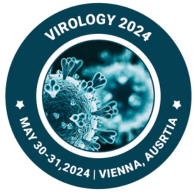Call for Abstract
Scientific Program
World congress on Immunology and Virology Diseases, will be organized around the theme “Viral Genomics and Evolution”
Virology Meet 2024 is comprised of keynote and speakers sessions on latest cutting edge research designed to offer comprehensive global discussions that address current issues in Virology Meet 2024
Submit your abstract to any of the mentioned tracks.
Register now for the conference by choosing an appropriate package suitable to you.
Covering fundamental concepts of immunology, including the immune system components, mechanisms, and cell types involved.Complex network of cells, tissues, and molecules that work together to defend the body against infections and diseases. Understanding basic immunology is essential for comprehending how the immune system functions and how it responds to threats.
Presenting advances in diagnostic methods for detecting viral infections, including molecular techniques and serological assays.Viral diagnostics are laboratory tests and techniques used to detect, identify, and characterize viral infections in patients. Accurate diagnosis of viral infections is essential for appropriate patient management, treatment, and public health measures.
- Nucleic Acid Amplification Tests
- Serological tests
- Viral culture
- Next Generation Sequencing
Discussing the spread of viral diseases, epidemiological models, and public health measures to control outbreaks.Epidemiology is the study of the distribution and determinants of diseases and health-related events in populations. Epidemiologists use various methods and tools to investigate patterns of disease occurrence, risk factors, and the impact of interventions.
Addressing the latest discoveries and challenges associated with emerging viral infections, such as COVID-19 and Zika virus.Emerging viral diseases are infectious diseases caused by newly discovered or previously rare viruses that have the potential to spread rapidly and cause outbreaks or epidemics. These diseases often pose significant public health challenges due to their unpredictable nature and the lack of pre-existing immunity in human populations.
- COVID-19
- Ebola Virus Disease
- Zika Virus Infection
Highlighting vaccine development for viral diseases, including updates on vaccine efficacy and safety.Viral vaccines are preventive measures designed to stimulate the immune system's response to specific viruses, thereby providing immunity against viral infections. Vaccines are a crucial tool in public health because they can prevent the spread of diseases and protect individuals from severe illness or complications.
Covering the host immune response to viral infections, including immune evasion strategies employed by viruses. Viral immunology is a branch of immunology that focuses on the immune system's response to viral infections. It seeks to understand how the immune system detects, fights, and remembers viral pathogens.
- Immune recognition of virusess
- Innate Immunity
- Adaptive Immunity
Exploring the genetic diversity of viruses, their evolution, and the implications for disease outbreaks. Viral genomics is the field of study that involves the sequencing and analysis of the genetic material (genomes) of viruses. This field has become increasingly important in understanding viral diversity, evolution, and pathogenicity.
Viral evaluation typically refers to the assessment and diagnosis of viral infections, as well as the monitoring of viral load and response to antiviral treatments.
Discussing the development and application of antiviral drugs and treatments to combat viral infections. Antiviral therapies are medications or treatment strategies designed to combat viral infections by inhibiting the replication or spread of viruses. These therapies can be used to prevent viral infections, manage acute infections, or suppress chronic viral diseases.
Investigating how viruses cause diseases, including their molecular and cellular mechanisms. Viral pathogenesis refers to the process by which viruses cause diseases in their hosts. It involves the study of how viruses infect host cells, evade the host immune system, replicate, spread within the host, and ultimately lead to clinical symptoms.
- Infection and Replication
- Spread and Dissemination
Exploring the connection between metabolism and immune function, including how metabolic pathways impact immune responses. Immunometabolism is a relatively recent field of research within immunology that explores the intricate relationship between the metabolic processes of cells and the functioning of the immune system. It focuses on how the metabolic state of immune cells influences their activation, differentiation, and effector functions.
Examining the interactions between pathogens and the immune system, including strategies employed by pathogens to evade immunity. Infectious diseases and immunity are closely intertwined topics within the field of immunology. Immunity is the body's defense mechanism against infectious diseases, and understanding how the immune system responds to pathogens is crucial in preventing and treating these diseases.
Highlighting novel approaches to treating diseases using immunotherapeutic strategies, including monoclonal antibodies and immune checkpoint inhibitors. Immunotherapy is a type of medical treatment that harnesses the body's own immune system to combat diseases, particularly cancer and autoimmune disorders. Unlike traditional treatments like chemotherapy or radiation therapy, which directly target cancer cells or suppress the immune system, immunotherapy aims to stimulate or enhance the body's natural immune response.
- Cancer Immunotherapy
- Autoimmune Disease Immunotherapy
- Vaccines as Immunotherapy
Discussing the mechanisms of inflammation and how the immune system responds to pathogens and tissue damage. Inflammation is a vital part of the immune response and is the body's way of defending itself against harmful stimuli, such as infections, injuries, or irritants. The process of inflammation involves a complex interplay of immune cells, signaling molecules, and physiological changes.
Exploring the role of genetics and genomics in understanding immune responses and susceptibility to diseases. Immunogenetics and genomics are two closely related fields of study within immunology that focus on understanding the genetic basis of immune system function and its relevance to human health and disease.
Focusing on the development of vaccines to prevent infectious diseases, including the latest advancements and challenges. Vaccine development is a complex and highly regulated process that involves the creation of vaccines to prevent or control infectious diseases.
- Identification of target pathogen
- Preclinical Research
- Clinical Trails
Discussing clinical applications of immunology, such as immunotherapy, autoimmune diseases, and immunodeficiency disorders. It involves the diagnosis, treatment, and monitoring of various conditions in which the immune system is either overactive (resulting in autoimmune diseases or allergies) or underactive (leading to immunodeficiency disorders).

